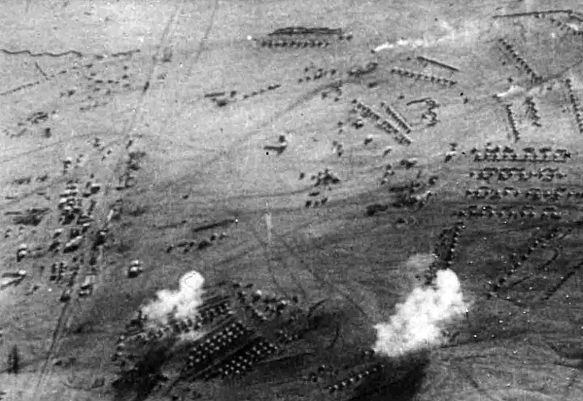Air raid of a South African military camp at the railway station Tschaukaib (German Southwest Africa), by k. u. k. lieutenant Fiedler, 17.12.1914
Chancellor of the German Empire, Otto von Bismarck, had opposed colonial acquisitions, arguing that the burden of obtaining, maintaining and defending such possessions would outweigh any potential benefit. But during the late 1870s and early 1880s public opinion shifted to favor colonies, and Bismarck gave limited support for these demands, arguing the home economy would not be able to support colonies. Bismarck was influenced by Hamburg merchants and traders, his neighbors at Friedrichsruh. The establishment of the German colonial empire proceeded smoothly, starting with German New Guinea in 1884. Other European nations, with Britain and France in the lead, had earlier acquired colonies in a rapid fashion. During the 1880s, Germany joined the European powers in the Scramble for Africa. Among Germany’s colonies were Togoland (now part of Ghana and Togo), Cameroon, German East Africa (now Rwanda, Burundi, and Tanzania), and German South-West Africa (now Namibia). The Berlin Conference (1884–85) established regulations for the acquisition of African colonies; in particular, it protected free trade in certain parts of the Congo basin. Germany later also acquired colonies in the Pacific.
A concept of foreign policy emerging in the late nineteenth century in Imperial Germany against the background of the country’s rise as a major industrial and trading nation. Coming out of the period of retarded economic growth known as the Great Depression of 1873–1895, German entrepreneurs were pushing for the acquisition of colonies in search of raw materials and markets for their goods. Already in the 1880s, Reich chancellor Otto von Bismarck had responded to these pressures and, in the larger context of the European “scramble for colonies,” had acquired territories in Africa and Asia. His successors, and Bernhard von Bülow in particular, promoted this overseas expansion even more vigorously after becoming the trusted adviser of Kaiser Wilhelm II, first as foreign secretary and from 1900 as chancellor. He was the person who coined such popular slogans of imperialist power politics as that of Germany seeking “a place in the sun” next to the other Great Powers. In the twentieth century, he added, Germany would either be “the hammer or the anvil” of world politics when it came to a redistribution of colonies and the allocation of territories that had not yet been annexed by the Europeans. Nor did he leave any doubt that he wanted Germany to be a hammer.
Given these claims, there has been a good deal of debate among historians as to the meaning of Weltpolitik. In the early years after World War II, most scholars tended to interpret it as some rather aimless yearning for prestige and for recognition of Germany as a latecomer to the international system, especially by Britain, then the dominant power in the world. No doubt Weltpolitik lacked precision in the public discourse of the time. But later work, based on newly discovered archival sources, has shown that this indeterminacy was more deliberate and that behind the slogans of the day there was a precise and well-thought-out strategy to make certain that Germany would succeed at the bargaining table when, as was widely expected, there would be a redistribution of colonies in the new century. Thus the ailing Portuguese Empire was thought to be an object of future power-political negotiation.
The kaiser and his advisers in the late 1890s were convinced that the German voice would not be heard unless it was backed up by military might. Although Germany had the strongest army in Europe, it was also clear that it would be useless against British naval power. Only a large German navy would be able to buttress future German claims. This is why it has been argued more recently that Weltpolitik, the vagueness of its definition for popular consumption notwithstanding, did have a hardcore plan to expand the Imperial navy into a powerful instrument that was capable of challenging even the Royal Navy. The fate of Weltpolitik was therefore inseparably linked to the success or failure of the kaiser’s naval program. By 1910– 1911, both had run into serious trouble. In 1909 Bülow lost his job, not least because his Weltpolitik diplomacy had led to the isolation of Germany. He could not prevent the conclusion of the Anglo-French Entente Cordiale in 1904, nor the formation of the Triple Entente of 1907, which brought in Russia. By 1911, it was also evident that the Tirpitz Plan was at its end, because the British, suspicious of German naval expansion, had “outbuilt” the kaiser in the arms competition that also began around 1904–1905.
Weltpolitik was now replaced by a retreat by Germany to the European continent. Stepped-up expenditure for the army began to replace the earlier massive funding of the navy. Berlin began to support its only reliable ally, the Austro-Hungarian Empire, and developed a siege mentality that contributed to the attempt to break out of the perceived encirclement of this Dual Alliance by Britain, France, and Russia in July 1914. The unleashing of World War I was therefore a preventive strike against France and Russia before the position of the two Central European powers had deteriorated to the point where the armies of the former could no longer be defeated, that is, before it was too late and the latter would become the “anvils” of the great power system.
FURTHER READING: Dehio, L. Deutschland und die Weltpolitik im 20. Jahrhundert. Vienna: Verlag für Geschichte und Politik, 1955; Hillgruber, Andreas. Deutsche Grossmacht und Weltpolitik im 19. und 20. Jahrhundert. Düsseldorf: Droste, 1977; Mommsen, Wolfgang J. Grossmachtstellung und Weltpolitik. Frankfurt am Main: Propyläen, 1993.
